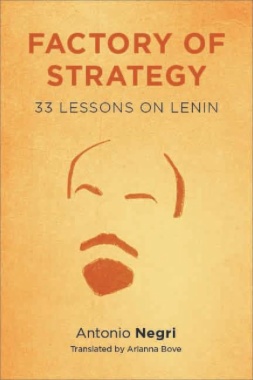Factory of Strategy is the last of Antonio Negri's major political works to be translated into English. Rigorous and accessible, it is both a systematic inquiry into the development of Lenin's thought and an encapsulation of a critical shift in Negri's theoretical trajectory.
Lenin is the only prominent politician of the modern era to seriously question the "withering away" and "extinction" of the state, and like Marx, he recognized the link between capitalism and modern sovereignty and the need to destroy capitalism and reconfigure the state. Negri refrains from portraying Lenin as a ferocious dictator enforcing the proletariat's reappropriation of wealth, nor does he depict him as a mere military tool of a vanguard opposed to the Ancien Régime. Negri instead champions Leninism's ability to adapt to different working-class configurations in Russia, China, Latin America, and elsewhere. He argues that Lenin developed a new political figuration in and beyond modernity and an effective organization capable of absorbing different historical conditions. He ultimately urges readers to recognize the universal application of Leninism today and its potential to institutionally—not anarchically—dismantle centralized power.
- Table of Contents
- Preface to the English Translation
- Preface to the Second Edition
- Translator’s Note
- Part I. Lenin and Our Generation
- 1. Toward a Marxist Reading of Lenin’s Marxism
- 2. From the Theory of Capital to the Theory of Organization (1): Economic Struggle and Political Struggle: Class Struggle
- 3. From the Theory of Capital to the Theory of Organization (2): The Working-Class Character of Organization: The Party as Factory
- 4. In Lenin’s Footsteps from the Theory of Capital to the Theory of Organization: Annotations
- 5. From the Theory of Organization to the Strategy of Revolution (1): Proletarian Independence
- 6. From the Theory of Organization to the Strategy of Revolution (2): The Factory of Strategy
- 7. From the Theory of Organization to the Strategy of Revolution (3): Organization Toward Communism
- 8. In Lenin’s Footsteps from the Theory of Organization to the Strategy of Revolution: Annotations
- 9. Insurrection as Art and Practice of the Masses
- Part II. Lenin and the Soviets in the Russian Revolution and Some Remarks on Sovietism
- 10. The Soviets Between Spontaneity and Theory
- 11. Lenin and the Soviets Between 1905 and 1917
- 12. The Soviets and the Leninist Inversion of Praxis
- 13. The Reformist Change of Praxis: Soviets Today?
- 14. Verifying the Question of Whether the Soviet Is an Organ of Power
- 15. The Soviet Form of Masses and the Urgency of Workers’ Struggle
- Part III. Interregnum on the Dialectic: The Notebooks of 1914–1916
- 16. Dialectics as the Recovered Form of Lenin’s Thought
- 17. Lenin Reads Hegal
- 18. Between Philosophy and Politics: The Weapon of Dialectics
- Part IV. The Economic Foundations of the Withering-Away of the State: Introduction to the Reading of The State and Revolution
- 19. “Where to begin?”
- 20. The Concept of the State in General Can and Must Be Destroyed
- 21. Opportunist and Revolutionary Conceptions of the Withering-Away of the State
- 22. The Question of the “Withering-Away” of the State: Against Equality
- 23. First Approach to a Definition of the Material Bases of the “Withering-Away”: Against Work, Against Socialism
- 24. Marx’s Anticipation of the Problem of “Withering-Away”: Against the Law of Value
- 25. Toward a Problematic View of Transition: Impossible Socialism and the Coming Communism
- 26. On the Problem of Transition Again: The Word to the Masses
- 27. Transition and Proletarian Dictatorship: The Particular Interests of the Working Class
- 28. Transition, Material Basis, and Expansiveness of the Working-Class Government
- 29. A Provisional Conclusion: Lenin and Us
- Part V. Appendix on “Left-Wing” Communism: A Conclusion and a Beginning
- 30. A Difficult Balance
- 31. A Definition of “Left-Wing” Communism, and Some (Adequate?) Examples
- 32. Toward a New Cycle of Struggles
- 33. From “Left-Wing” Communism to What Is to Be Done?

